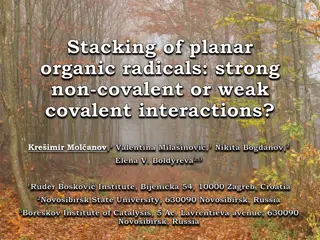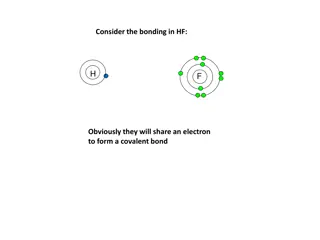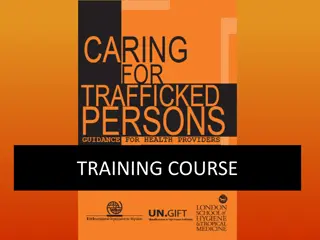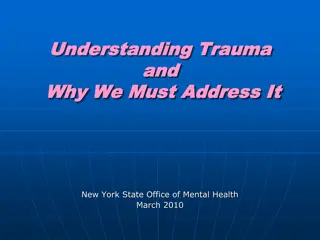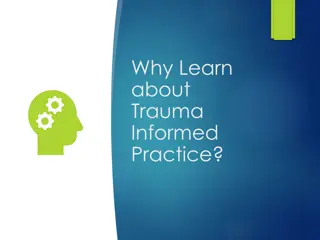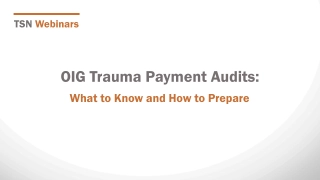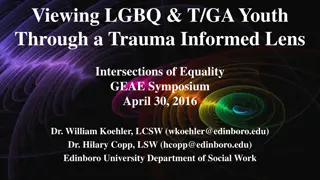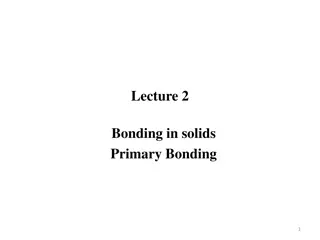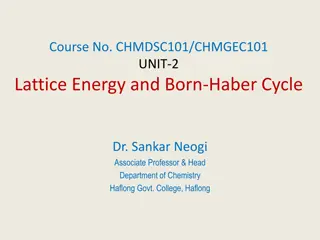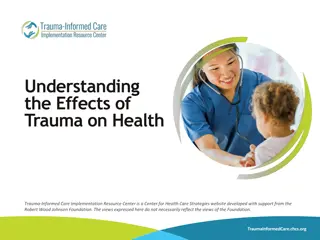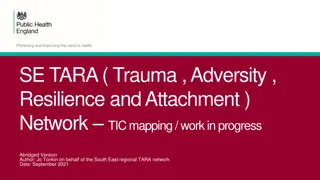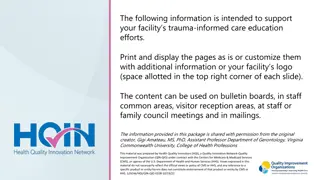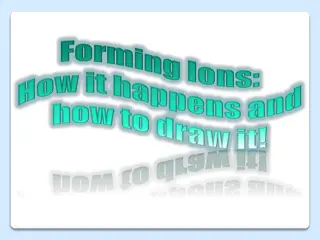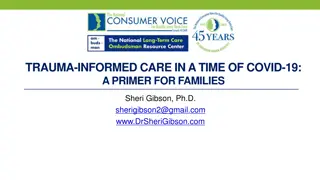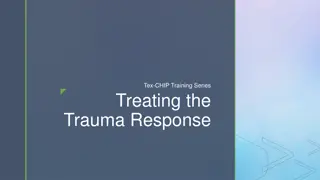Understanding Trauma Bonding in Trafficked Youth
Trauma bonding is an emotional attachment that develops between abusers and victims, often seen in youth who have been trafficked. This bond can make it difficult for victims to break free from exploitation. Understanding trauma and its impact on the brain is crucial in supporting these individuals and recognizing coercive tactics used by traffickers. By learning about trauma bonding, identifying survival strategies, and providing the right support, we can help youth overcome these damaging relationships and move towards healing.
Download Presentation

Please find below an Image/Link to download the presentation.
The content on the website is provided AS IS for your information and personal use only. It may not be sold, licensed, or shared on other websites without obtaining consent from the author. Download presentation by click this link. If you encounter any issues during the download, it is possible that the publisher has removed the file from their server.
E N D
Presentation Transcript
Define the term trauma bonding |OBJECTIVES| Recognize how trauma impacts the brain Recognize the difference between familial trafficking trauma After participating in this training attendees will be able bonding and intimate partner trauma bonding to . . . Understand coercion tactics used by traffickers Identify when survival strategies/coping mechanisms are present Learn the first steps to support a youth when struggling with attachment to their trafficker
WHAT IS|HUMAN TRAFFICKING? Human trafficking is the exploitation of humans for purposes such as sexual and labor servitude where something of value is exchanged through the means of force, fraud, or coercion. **For minors under 18, force, fraud, or coercion does not need to be present.**
THE IMPORTANCE OF|UNDERSTANDING TRAUMA Trauma is a deeply disturbing experience; an emotional response to a terrible event Understanding trauma helps: us see why some victims become attached or have an unhealthy connection with their abuser. us show compassion in dealing with youth who have a bond or connection with their abuser. us lessen the thought process of victim blaming The deepest wounds are often the ones that can t be seen
HOW DOES|TRAUMA IMPACT THE BRAIN? During a single incident of trauma, the limbic system over-activates & the prefrontal cortex, the brain s logic center, shuts down. Prefrontal cortex helps predict the consequences of one s actions; anticipating events in the environment Impulse control; managing emotional reactions Hippocampus is responsible for putting experience into chronological order and into perspective Amygdala catalogues past sensory experiences (threats, anger) as implicit memories, memories that are unconscious but can affect thoughts and behaviors **A victim might return to the trafficker due to the intensity, familiarity, and routine provided by the relationship.
|POLL| HAVE YOU EVER EXPERIENCED A TRAUMA?
WHAT IS|TRAUMA BONDING? A trauma bond is an emotional attachment between an abuser and victim. Trauma bonds in sex trafficking compel victims to submit to continued exploitation and protect the trafficker. The Process of a Trafficker when a trafficker uses rewards and punishments within cycles of abuse to foster a powerful emotional connection with the victim. trauma bonding is commonly referred to as Stockholm Syndrome, and the terms may be used interchangeably Recruitment Befriends & Gains Trust Grooming Manipulation & Testing Limits Seasoning Isolation & Abuse Romeo Pimp or Boyfriending: One who prides himself on controlling others primarily through psychological manipulation. Although he may shower his victims with affection and gifts (especially during the recruitment phase), the threat of violence is always present.
TRAUMA BONDING|INTIMATE PARTNER Traffickers may take on a role of protector to: maintain control of the victim create confusion develop a connection or attachment increase the victim s feeling a sense of loyalty to or love for the trafficker. The victim s social and economic circumstances may contribute to their developing a sense of trust and loyalty towards a trafficker. 29-male
TRAUMA BONDING|INTIMATE PARTNER Power & Control Wheel Building Trust: avoid demeaning or derogatory statements avoid discrediting feeling or comparing experiences give space within reason be authentic offer a yes sometimes develop cultural competency 29-male
TRAUMA BONDING|FAMILIAL Familial Sex Trafficking (FST) is a type of trafficking whereby a family member facilitates sexual access to a child in exchange for something of commercial value. A family Member may include Consanguine (blood) biological mother/father, siblings, grandparents Custodial (marriage) spouse, step-father/mother, adopted, in-laws Foster/adoptive family Familial Trafficking accounts for 26-47% of child trafficking cases in the United States 29-male Most often seen in rural communities
TRAUMA BONDING|FAMILIAL Victims of familial trafficking much younger Median age 11 years old Compared to 13 + for intimate partner Females are disproportionately affected Boys are victims too and much younger Biological mother most often the perpetrator The second most common perpetrator profile was Mother + Paramour Keep in mind: mother is gatekeeper (the one 29-male granting access, not the one committing the abuse)
FROM THE CHILDS|PERSPECTIVE Do not underestimate the power of parental authority and influence Understand grooming and conditioning loyalty runs deep truth about trauma bonding May not see themself at trafficking victim Child may be in the parental role taking care of mom (substance abuse, mental health issues) 29-male taking care of siblings taking care of self
RECOGNIZING|SURVIVAL STRATEGIES Children will work tirelessly to preserve attachment with primary caregiver Will change or restructure reality Wheel Plugs Negative Cognitive Beliefs Sense of agency/power in the family Life is organized around a survival system What do I need to do to survive today in this environment? The deepest wound is not from the physical abuse but instead from the relationship betrayal
COMMON NEGATIVE COGNITIONS | THOUGHTS & BEHAVIORS THOUGHTS BEHAVIORS My World Is Cruel and Not Safe Isolation, cries easily, defiant, aggressive, etc. I Am Not Loved Low moods, tries hard for approval I Am Unworthy Hard to accept praise or compliments 29-male I Am Unlovable Unhealthy attachments/toxic relationships
HOW TO|SUPPORT YOUTH IMPACTED SAFETY CHOICE ENGAGEMENT
HOW TO|SUPPORT YOUTH IMPACTED Safety and Basic Needs Establishing household expectations + boundaries Awareness of potential triggers a person may have Maslow Hierarchy of Needs Trauma Awareness Training ( ex: today s presentation) Assume that every youth in your home has been affected by some trauma Be willing to go above and beyond to get access to trauma specific services
HOW TO|SUPPORT YOUTH IMPACTED Rebuild control and empowerment Often during a traumatic situation (abuse, neglect, sexual assault, trafficking etc.) control is taken away from a person. As often as we can, give youth the opportunity to make a choice Engage with strengths-based approach Help youth identify their own strengths Be intentional with strength based language + redirection Shift perspective and understand that there is nothing wrong with the child but rather something happened to them and they are surviving the best way they know how
HOW TO|SUPPORT YOUTH IMPACTED The nitty gritty Go with the flow and release the need to control children with trauma will not behave the way you think they should drop the shoulda, coulda, woulda s Lower the expectations do not expect praise, appreciation, and adoration from the child lower the bar. If need be, bury the bar Disruptions should be rare not the norm Lean into natural consequences instead of punishments Keep plenty of food stocked that all children in the home have access to Do not share histories of the child with others. Ever. Most importantly, take care of yourself. Do not take too many high needs children into your home when you are not prepared Use respite + other supports/support systems THERAPY, THERAPY, THERAPY
STATEWIDE RESOURCES | TCTA West Tennessee Restore Corps Referral line: 901.410.3590 ext. 104 restorecorps.org Middle Tennessee Ancora TN Referral line: 615.806.6899 ext. 1 Ancoratn.org East Tennessee Grow Free Tennessee Referral line: 865.292.0285 growfreetn.org Tennessee Counter Trafficking Alliance https://www.tncountertraffickingalliance.org/
20 20
HUMAN TRAFFICKING|TCTA SERIES Human Trafficking Overview Trafficked Youth: Needs + Vulnerabilities Trauma Bonding and Trafficked Youth Crisis Intervention and Safety Planning Self-Care and Building a Network of Support Trafficking Specific Resources OTHER|TRAININGS TBRI (Trust Based-Relational Intervention) CPI ( Crisis Prevention Intervention) Motivational Interviewing Techniques Empathy + Compassion Training 29-male


